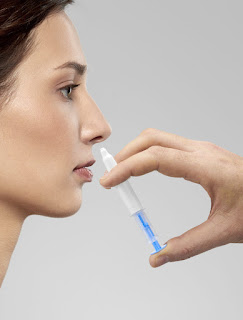Measles Vaccine Rash: What It Is, Causes, Symptoms & Treatments
China's Wuhan Virology Institute Creates Nasal Covid-19 Vaccine For 'future Pandemics'
Researchers from the Wuhan Institute of Virology in China have developed a nanovaccine candidate that could offer universal protection against all major Covid-19 variants – as well as protect against future coronavirus mutants with pandemic potential.The institute – which has engaged in bat coronavirus research for years – has in recent years been embroiled in controversy, and scrutiny from countries including the United States, over accusations that the Covid-19 pandemic originated from a lab leak at its facilities.
But with consistent support from the Chinese government, researchers at the institute have continued their studies into Sars-CoV-2, the coronavirus that causes Covid-19.
Although existing vaccines have been used to help prevent the spread of Sars-CoV-2 and reduce mortality, none offer broad or universal protection against all forms of the virus, according to the team behind the nanovaccine.
The team discovered that combining coronavirus epitopes – parts of antigens that trigger the immune system – with the blood protein ferritin could produce an intranasal nanoparticle vaccine that protected against multiple variants of Sars-CoV-2.
Ditch The Needle – New COVID Vaccine For Nose, Mouth Reportedly Halts Transmission
Researchers at Washington University in St. Louis are ditching the vaccine needle for a nasal spray that reportedly can block the spread of COVID-19. A new study found that vaccines that target points of entry can contain the spread of respiratory infections and prevent transmission.
Dr. Jacco Boon said that needle-based vaccines are not as effective as ones administered through the nose and mouth.
"This mucosal vaccine, unlike the injectable vaccine, did prevent transmissions from the infected individual to, for example, your partner or other members of the household," he said. "This is what we're trying to model."
The challenge he faces is that it's difficult for nasal vaccines to control virus levels in the nose, not to mention which specific virus strain the vaccine targets. Through his work experimenting on hamsters, Boon found that people who were given the nasal vaccine did not pass the virus onto others.
"The nose and the mouth are the point of entry," he added. "So having these cells and these antibodies present right there where the virus comes in is really critical for the most effective vaccines against these viruses."
But the nasal vaccine triggers an immune response in the nose and upper airway – where the virus enters the body.
"By reducing the titer (particle) 100- to 1000-fold, we're much less likely to be severely ill," Boon said. "It may just be a subclinical infection or even a very mild disease. But again, the most striking fact of that reduction is that the virus titers (particles) are not high enough to allow transmission."
The nasal vaccine has been approved for use in India. Wash-U, meanwhile, licensed the technology to an American biotech company in hopes of developing a vaccine in the U.S. And Europe.
Click here for more information.
Copyright © 2024 Missourinet
New Needle-free COVID-19 Nasal Vaccine Offers Lasting Protection
Researchers at Griffith University have developed a new COVID-19 vaccine that can be administered through the nose, offering a promising alternative for those who are afraid of needles.
This next-generation vaccine, called CDO-7N-1, has shown strong potential in providing long-lasting immunity against COVID-19 and its variants with just a single dose.
The research, led by Professor Suresh Mahalingam from Griffith's Institute for Glycomics, has been in progress for the past four years and was recently published in Nature Communications.
The vaccine is designed to be given intranasally, meaning it is sprayed into the nose rather than injected.
This method not only makes the vaccine easier to administer but also triggers immunity in both the nasal passages and the rest of the body.
Professor Mahalingam explained that CDO-7N-1 is a live-attenuated vaccine, which means it uses a weakened form of the virus to stimulate the immune system.
This type of vaccine offers several benefits, including strong and long-lasting immunity, often with just one dose.
"The vaccine induces strong memory responses in the nasal mucosa, offering long-term protection for up to a year or more," he said.
One of the key advantages of CDO-7N-1 is its broad protection. Unlike mRNA vaccines, which target only the spike protein of the virus, this nasal vaccine induces immunity against all major SARS-CoV-2 proteins.
This makes it effective against all known variants of the virus, as well as SARS-CoV-1, the virus that caused the original SARS outbreak.
Dr. Xiang Liu, the lead author of the study, highlighted that the vaccine also provides strong protection against virus transmission and reinfection, helping to prevent the spread of COVID-19 and the emergence of new variants.
Another benefit is that the vaccine remains stable at 4°C (about 39°F) for up to seven months, making it particularly useful in low- and middle-income countries where cold storage is a challenge.
The vaccine has already been licensed to Indian Immunologicals Ltd, a leading vaccine manufacturer. Dr. K. Anand Kumar, Managing Director of the company, stated that they have completed all necessary studies and are preparing to move forward with clinical trials.
Professor Lee Smith, Acting Director of the Institute for Glycomics, expressed his excitement about the research findings, noting that this new vaccine could play a crucial role in making COVID-19 vaccination more accessible and effective worldwide.
The development of this needle-free, nasal vaccine represents a significant step forward in the fight against COVID-19, offering a more convenient and potentially more effective option for preventing the disease.
If you care about COVID, please read studies about vitamin D deficiency linked to severe COVID-19, death, and how diets could help manage post-COVID syndrome.
For more health information, please see recent studies about COVID infection and vaccination linked to heart disease, and results showing extracts from two wild plants can inhibit COVID-19 virus.
COVID-19 intranasal vaccine. Credit: Griffith University.



Comments
Post a Comment